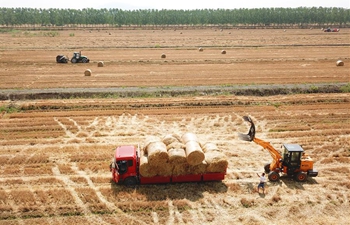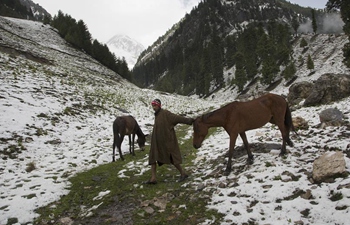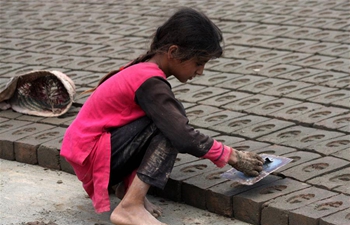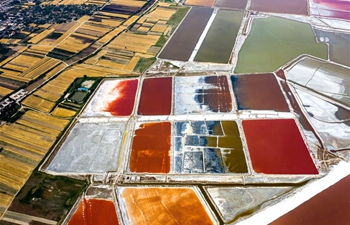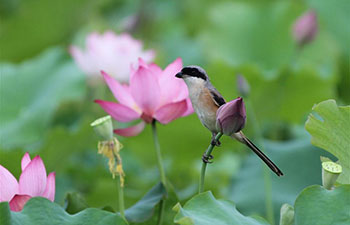by Ejidiah Wangui
NAIROBI, June 13 (Xinhua) -- It is hard to miss the sound of chirping crickets at James Muriithi's farm located in Kajiado county that neighbors the Kenyan capital of Nairobi.
The well-tended farm plays host to millions of crickets housed in a shelter that has been modified to mimic the dark environment conducive for the insects to thrive.
Not bothered by the irritating sounds, Muriithi says since he ventured into farming a few years ago, crickets are so far his best.
Before going into cricket farming, he tried his hand in poultry but is yet to recover from the losses he suffered.
"One of the advantages of rearing insects is that they are not labor-intensive. Also, the cost of running an insect farm is negligible compared to that of running a poultry farm. The insects eat very little, consume very little water and you don't have to be there full time," said Muriithi on Wednesday.
His interest to venture into insect rearing was aroused one day during an agriculture exhibition in Nairobi where one of the exhibitors -- a university, showcased different products made from crickets.
"I tasted some of the products being exhibited and I couldn't believe I was consuming crickets; the taste was more like that of peanuts. I had never thought the same insects we hear at night chirping would be made into food. I embarked on researching more about the insects and realized the idea was viable. I did away with the poultry and set up my cricket farm, so far so good," said Muriithi.
John Kinyuru, a researcher at Jomo Kenyatta University of Agriculture and Technology (JKUAT), said that insects are the future of food and it is just a matter of time before more farmers start venturing into rearing edible insects.
The researcher who is the head of insects farming project at the learning institution, says crickets offer a high-protein alternative to chicken and beef yet a kilogram of crickets goes for less than one U.S. dollar. A kilogram of beef goes for 5 dollars.
"Crickets are good food, they are very rich in proteins and anyone can afford to buy them. It has been a long journey trying to convince Kenyans why they should rear and eat insects but I can bet in five years to come, the story will be different. It is also good for our environment," said Kinyuru.
He said that crickets require only two kilograms of feed for every one kilogram of body weight gain. In addition, insects can be reared on organic side-streams and can help reduce environmental contamination.
The Food and Agriculture Organization (FAO) of the United Nations has also been at the frontline of promoting insect consumption in the region.
"Insects are reported to emit fewer greenhouse gases and less ammonia than cattle or pigs, and they require significantly less land and water than cattle rearing," said Kinyuru.
A report published by scientists at the University of Copenhagen in 2018 compares cricket production in Thailand to broiler chicken farming on equivalent scale and found that crickets were better for the environment.
According to the report, cricket production had a lower negative impact on the environment than the rearing of broiler chicken.
"The cost of running a cricket farm is very little, one cricket eats almost 0.01 grams of food in a day, they also drink almost zero water. The cost of running a cricket farm is really low, anyone interested in farming crickets should not have any excuse. Kenyans like eating good food and cricket is one of them, it is just a matter of time," said Kinyuru.
The researcher remains optimistic that the long and treacherous journey which began in 2006 will soon bear fruit given the many people reaching out to be trained in farming insects.
"The journey is taking shape, we receive calls daily from people interested in farming crickets, we are actually in the process of developing a mobile phone app that will link farmers and experts as we can already tell the interest is picking. We are heading into a period where you will have crickets in the menus of restaurants and food stores," said Kinyuru.
